نقد و بررسی
مبانی نظری و پیشینه پژوهش اشتیاق شغلی با منابع 2024-2025فهرست مطالب:
- اشتیاق شغلی
- ابعاد اشتیاق کاری
- استراتژي هاي افزايش اشتیاق کاری
- مزاياي افزايش اشتیاق کاری
- محرک های اشتیاق کاری
- نظریه های اشتیاق کاری
- نظريه كان
- نظریه شوفلی
- منابع فارسی
- منابع غیر فارسی
بخشی از محصول
تاکنون تعاریف بسیاری در مورد اشتیاق کاری مطرح شده است اما هنوز در این زمینه تعریفی که مورد قبول و تأیید همگان باشد ارائه نشده است (ارتانی،1402). دلیل این عدم وحدت را اینچنین بیان میکنند: اشتیاق کاری كاركنان، از پارادايم هاي جديد حوزۀ منابع انساني بوده و به دليل راه¬هاي متنوع بهره برداري از آن، تعاريف چندگانهاي را داراست. اکثر تعاریف اذعان دارند که اشتیاق از منابع شخصی و محیطی نشأت میگیرد (انگورج و همکاران، 1403). به نظر ابب (2023) اشتیاق کاری افراد با استعداد، يك رابطۀ احساسي و هوشي است كه كارمند با شغل، سازمان، مدير و همكارانش دارد و بر روي تلاش¬هاي مضاعف او در كارش تأثيرگذار است. علی (2023) نيز اشتیاق را يك تفكر مثبت و واقعي دانسته كه به وسيلۀ قدرت، فداكاري و جذابيت توصيف ميشود و موجبات تمايل و رضايت افراد را در اشتياق به انجام كار فراهم مينمايد.
منابع فارسی
- ارتانی، امیر، (1402)، ارائه مدل ساختاری رهبری زهرآگین مدیران بر رضایت شغلی معلمان با نقش میانجی تعهد سازمانی در مدارس ابتدایی، سومین کنفرانس بینالمللی علوم انسانی، علوم آموزشی، حقوق و علوم اجتماعی، 3(1)، 1-19
- انگورج، عبدالکریم و کیالاشکی، جعفر و خدابنده، پوریا، (1403)، بررسی تاثیر سرمایه اجتماعی بر توانمندسازی کارکنان با در نظر گرفتن متغیر میانجی تعهد سازمانی در فرمانداری شهرستان چالوس، نوزدهمین کنفرانس ملی اقتصاد، مدیریت و حسابداری، شیروان، 19(1)، 14-1
- بهمنی، طاهره، (1402)، نقش واسطهای اعتماد سازمانی در رابطه بین رهبری خدمتگزار و جو اخلاقی سازمان در معلمان مقطع ابتدایی شهر بهبهان، سومین کنفرانس بینالمللی تفکر سیستمی در عمل، مشهد، 3(1)، 17-1
- پیام، مهدی، نگین تاجی، صدیقه، بشلیده، کیومرث، نگین تاجی، مجید، و هاشمی، سیداسماعیل. (1398). رابطهی هوش معنوی، قدردانی، تعهد سازمانی و اشتیاق شغلی، پژوهشهای روانشناسی بالینی و مشاوره، 8(1)، 36-21
- خلیلی، علی، (1403)، مطالعه تاثیر کیفیت زندگی کاری بر بهرهوری فردی با اثر میانجی تعهد سازمانی؛ نقش تعدیلگری سبک رهبری (مطالعه موردی: شرکت سهامی ذوب آهن اصفهان)، دهمین کنفرانس بینالمللی علوم مدیریت و حسابداری، تهران، https://civilica.com/doc/2026481
- رضائی، حسین، (1403)، بررسی رابطه بین درگیری شغلی، رضایت شغلی و تعهد سازمانی در بین کارکنان سطوح پایین، چهارمین کنفرانس بینالمللی و هفتمین کنفرانس ملی مدیریت، روانشناسی و علوم رفتاری، تهران، https://civilica.com/doc/2028009
- دانشمندمهر، مریم، و کاویان پور، حیدر. (1400). بررسی تأثیر اقدامات منابع انسانی درک شده بر قصد ترک خدمت با در نظر گرفتن نقش میانجی مشارکت کارکنان، تعهد سازمانی و رفتار شهروندی سازمانی (موردمطالعه: کارکنان نداجا). آموزش علوم دریایی، 8(25)، 131-148
- زارعان دولتآبادی، محمد، شاهطالبی حسینیآبادی، بدری، جعفری هرندی، رضا. (1400). ارائه مدل رفتار شهروندی سازمانی معلمان مدارس دولتی ایران. سبک زندگی اسلامی با محوریت سلامت، 5(12)، 109-129
- شریعتمداری، مهدی، عابدی، زهره، ندیمی، اکرم. (1397). نقش میانجی تعهد سازمانی در تأثیر رضایت شغلی بر رفتار شهروندی سازمانی دبیران. مطالعات منابع انسانی، 8(2)، 18-1
- ضیاالدینی، محمد؛ رمضانی قوامآبادی، سکینه. (1392). الگوی غنیسازی و اشتیاق شغلی برای سنجش میزان تمایل به ترک خدمت کارکنان. مجله مطالعات مدیریت راهبردی، شماره 51، صص 199-177
- فردین، صدیقه، (1402)، بررسی تاثیر تعهد سازمانی بر رفتار شهروندی سازمانی، بیستمین کنفرانس ملی روانشناسی، علوم تربیتی و اجتماعی، بابل، https://civilica.com/doc/1784425
- عقیقی، علیرضا. (1397). تبیین نقش ارزشهای اخلاقی و رفتار شهروندی سازمانی با رضایتمندی مشتریان، فصلنامه اخلاق در علوم و فناوری، 13(4)، 53-45
- قادسی، حمیدرضا و کیوانی فرد، فاطمه و امیدیان، فرانک و بدیلی زاده، زهره، (1403)، بررسی نقش میانجی تعهد سازمانی در رابطه بین اخلاق کار اسلامی با رضایت شغلی مدیران دوره ابتدایی شهر دزفول، دهمین کنفرانس بینالمللی علوم مدیریت و حسابداری، تهران، https://civilica.com/doc/2026497
Non-Persian References
- Abebe, A., & Assemie, A. (2023). Quality of work life and organizational commitment of the academic staff in Ethiopian universities. Heliyon, 9(4), e15139. https://doi.org/10.1016/j.heliyon.2023.e15139
- As, N., Eko, B., & Sani, A. (2021). Predicting factors of organizational citizenship behavior in Indonesian nurses. Heliyon, 7(August), e08652. https://doi.org/10.1016/j.heliyon.2021.e08652
- Ashraf, S., & Khan, A. S. (2023). The Impact of Ethical Climate on Employee Organizational Commitment in Healthcare Organizations. Journal of Business Ethics, 214(1), 123-140.
- Ali, M. I. (2023). The Mediating Role of Leader Ethical Behavior in the Relationship between Ethical Climate and Employee Organizational Commitment. Leadership & Organization Development Journal, 44(2), 213-232.
- Ahmad, K., Mukhtyar, M., & Kanwal, Z., (2023). Effect of distributed leadership practices on teacher performance: Comparing the difference in teacher’s performance on the basis of demographic characteristics. Palarch’s Journal of Archaeology of Egypt/Egyptology 19(3), 1304-1317.
- Argina, A. W., Mitra, D., Ijabah, N., & Setiawan, R. (2018). Indonesian PISA result: What factors and what should be fixed?. In Proceedings Education and Language International Conference. http://jurnal.unissula.ac.id/index.php/ELIC/article/view/1212
- Bernarto, I., Bachtiar D & Sudijo, N. (2018). The effects of transformational leadership, perceived organizational support on job and life satisfaction of preschool teachers. International information Institute. 21(4), 1301-1320.
- Buck, V. B. (2018). The impact of transformational leadership on nonprofit volunteer engagement and commitment. A Dissertation Doctor of Philosophy Leadership and Organization Change. College of Management and Technology Walden University
- Borst, R. T., Kruyen, P. M., Lako, C. J., & De Vries, M. S. (2020). The Attitudinal, Behavioral, And Performance Outcomes Of Work Engagement: A Comparative Meta-Analysis Across The Public, Semipublic, And Private Sector. Review Of Public Personnel Administration, 40(4), 613-640.
- Bernuzzi, C., Sommovigo, V., & Setti, I. (2022). The role of resilience in the work-life interface: A systematic review. Work (Reading, Mass.), 73(4), 1147–1165.
- Cameron, K. (2019). What we know and don’t know about passion for work. In R. J. Vallerand, & N. Houlfort (Eds.), Passion for work: Theory, research, and applications (pp. 505–528). Oxford University Press.
- Chichekian, T., & Vallerand, R. J. (2022). Passion for science and the pursuit of scientific studies: The mediating role of rigid and flexible persistence and activity involvement. Learning and Individual Differences, 93, 102104
- David A. Wilder (2024) Volume 44 Issue 1 of the Journal of Organizational Behavior Management, Journal of Organizational Behavior Management, 44:1, 1-2, DOI: 10.1080/01608061.2024.2310357 https://doi.org/10.1080/01608061.2024.2310357
- Daniel Cymbal, Fran Echeverria & David A. Wilder (2024) Practitioners’ Views on Essential Coursework, Skills, and Fieldwork in Organizational Behavior Management Graduate Training Programs, Journal of Organizational Behavior Management, DOI: 10.1080/01608061.2024.2304563 https://doi.org/10.1080/01608061.2024.2304563
- Egan R., Zigarmi D., Richardson A. (2019). Leadership behavior: A partial test of an employee work passion model. Human Resource Development Quarterly, 30, 311–341.
- Foster, K., Roche, M., Giandinoto, J. A., & Furness, T. (2020). Workplace stressors, psychological well-being, resilience, and caring behaviours of mental health nurses: A descriptive correlational study. International Journal of Mental Health Nursing, 29(1), 56–68.
- Fuller, J., & Kerr, W. (2022). The great resignation didn’t start with the pandemic. Harvard Business Review. https://hbr.org/2022/03/the-great-resignation-didnt-start-with-the-pandemic
- Freyer M, Formazin M, Rose U (2019) Factorial validity of the work ability index among employees in Germany. J Occup Rehabil 29:433–442.
- Fakultas Ekonomi dan Bisnis Universitas Udayana (Unud), Bali, Indonesia Berdasarkan Undang-Undang (UU) Perbankan No. 8(3), 1784–1812.
- Farooq, K. (2015). Journal of Political Sciences & Organization Citizenship Behaviour a Key for Employee Retention: An Empirical Investigation from Systematic Institutional Industry Pakistan. 3(2). https://doi.org/10.4172/2332-0761.1000151
- Gita, P., Charmiati, H. A., Bagus, I., & Surya, K. (2019). PENGARUH KEPUASAN KERJA TERHADAP ORGANIZATIONAL CITIZENSHIP BEHAVIOR (OCB) DENGAN KOMITMEN ORGANISASIONAL SEBAGAI VARIABEL MEDIASI
- Hlaďo P, Dosedlová J, Harvánková K et al. (2020) Work ability among upper-secondary school teachers: examining the role of burnout, sense of coherence, and work-related and lifestyle factors. Int J Environ Res Public Health 17(24):9185.
- Kaur K, Randhawa G. (2021). Exploring the influence of supportive supervisors on organisational citizenship behaviours: Linking theory to practice. IIMB Management Review, 33(2): 156-165.
- Kumar, R. and Shukla, S. (2023), “A theory-based approach to model entrepreneurial intentions: exploring the role of creativity, proactive personality and passion”, Higher Education, Skills and Work-Based Learning, Vol. 13 No. 2, pp. 355-370. https://doi.org/10.1108/HESWBL-02-2022-0036
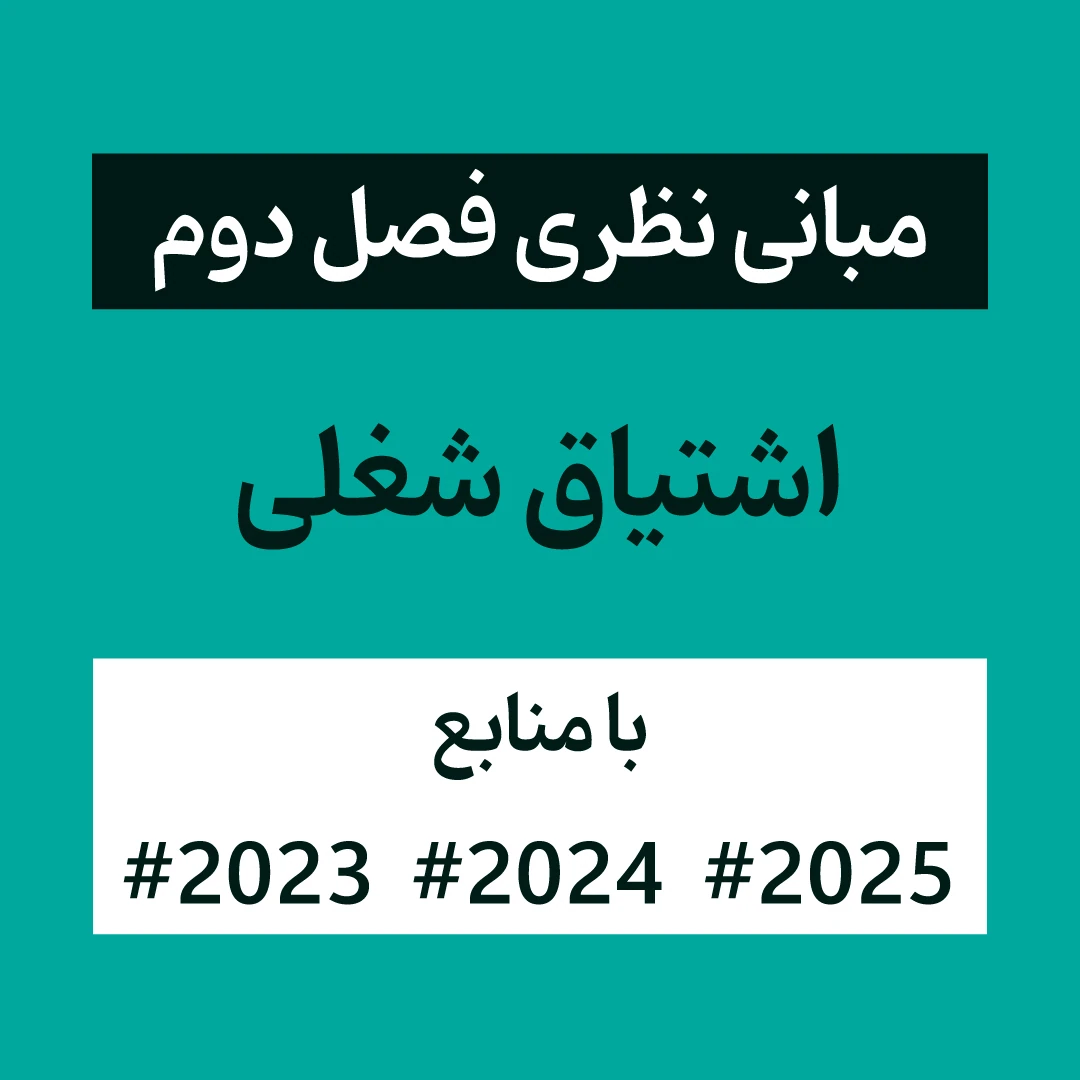

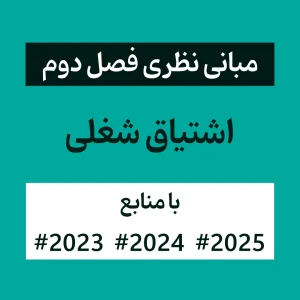
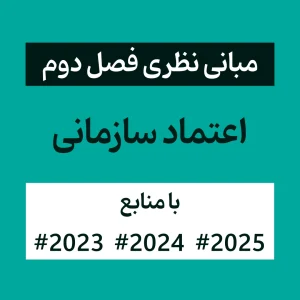
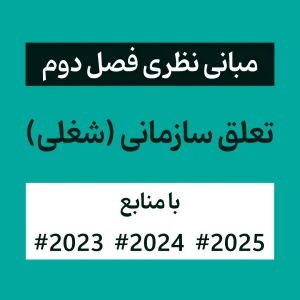
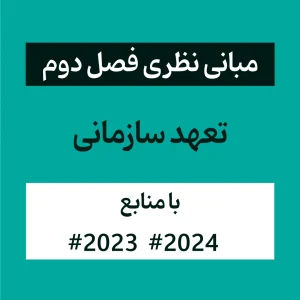
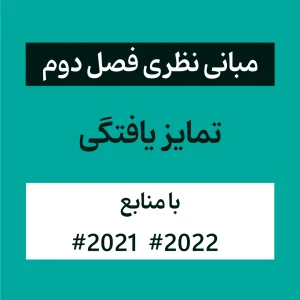

0دیدگاه